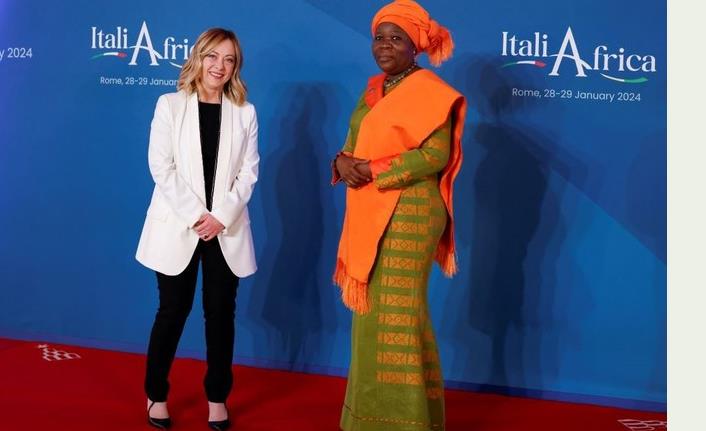
Giorgia Meloni said she felt a “burden weighing on my shoulders” after “breaking the heavy glass ceiling” to become Italy’s first female prime minister, in an address to parliament restating her pledge to back Ukraine and her opposition to illegal immigration.
Meloni, the leader of Brothers of Italy, a party with neofascist roots, has taken the helm of Italy’s most rightwing government – which includes Matteo Salvini’s far-right League and Silvio Berlusconi’s Forza Italia – since the second world war.
The new prime minister needs to pass votes of confidence in both houses of parliament before her administration can assume full power, but given the solid backing that the coalition has in both chambers, this procedure should be a formality.
Meloni, 45, used her speech, which lasted just over an hour and received about 70 rounds of applause, to denounce fascist-era racial laws and reiterate her unwavering support for war-torn Ukraine.
She pledged to crack down on illegal immigration while taking a swipe at detractors at home and abroad who are worried that her policies could jeopardise European unity and civil rights.
She criticised foreign governments who said they would keep a close watch on her government in relation to civil rights, saying such attitudes showed “a lack of respect for the Italian people”.
The previously Eurosceptic Meloni struck a reassuring tone when it came to economic issues and foreign policy, and while she stressed she did not want to “sabotage the EU”, she said it needed to be more efficient.
Meloni sparked a debate on female empowerment after being sworn into office on Saturday by using the masculine form of her title – for example, il presidente del Consiglio, instead of the feminine article, la presidente – in her first official statement. While using the feminine form for positions held by women is grammatically correct, anyone who prefers to use the masculine form is free to do so.
Meloni has never described herself as a feminist, is against “pink quotas” in boardrooms and believes roles should be attained according to merit rather than gender. Feminist critics say her politics are patriarchal and that as prime minister she will not do women’s rights any favours.
Meloni, however, began her speech by championing 11 illustrious Italian women over history from across the political spectrum.
“Among the many burdens I feel weighing on my shoulders today, there is also that of being the first woman to head the government in this nation,” she said. “When I dwell on this fact … I inevitably find myself thinking about the responsibility I have towards all women who face difficulties in asserting their talent or, more trivially, the right to see their daily sacrifices appreciated.”
Meloni read out a list of women who “built the ladder” that had allowed her to “climb up and break the heavy glass roof over our heads”. They included Tina Anselmi, an anti-fascism resistance leader and the first woman to hold a ministerial post; Oriana Fallaci, a war correspondent who was also a second world war partisan; and Samantha Cristoforetti, who last month became the first European woman to command the international space station.
“To them I say thank you for having demonstrated the value of Italian women, as I hope to be able to do too,” Meloni said.
Meloni started out in politics at the age of 15, joining the youth wing of the Italian Social Movement, a party set up by supporters of the fascist dictator Benito Mussolini. The party later morphed into the National Alliance before Meloni went on to found Brothers of Italy in 2012.
Meloni has refashioned the party as a conservative champion of patriotism, facilitating its rise from a marginal force that was polling at about 4% in the 2018 general election, to taking the largest share of the vote – 26% – in the national ballot on 25 September.
In a message directed at the foreign press in August, Meloni said Brothers of Italy had “handed fascism to history decades ago”. The formation of her government coincides with the 100th anniversary of Mussolini’s march on Rome.
Meloni, who in the past has praised Mussolini, said on Tuesday that she had never had “sympathy for regimes, including fascism,” adding that she had always considered Mussolini’s 1938 racial laws as “the lowest point in Italian history”.
She later added, however, that the political prejudice against her government was partly justified. “I come from a cultural area that has often been confined to the margins … I represent what the English would call an underdog.”
Wolfango Piccoli, a co-president of the London-based research firm Teneo, said: “Overall it was a strong performance from her. Especially as I don’t think she left much space for the opposition [to attack], and also because she tried very hard to sound reassuring while at the same time framing herself as the underdog – distinguishing herself from anybody else who has been in her position before.”












